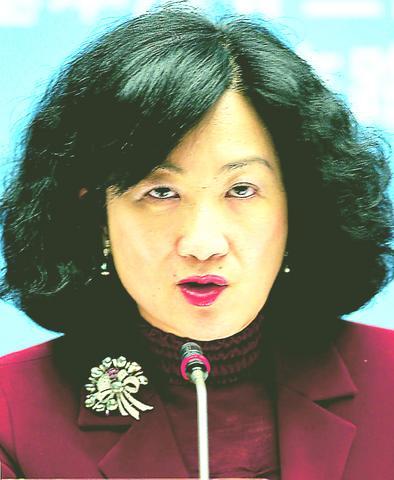Hong Kong Financial Secretary Antony Leung (梁錦松) announced his resignation yesterday just hours after the government said Security Secretary Regina Ip (葉劉淑儀) had quit.
Hong Kong Chief Executive Tung Chee-hwa (
Leung came under pressure to resign after it was revealed he had bought a luxury car just weeks before he announced in March the government's budget in which taxes on such cars were hiked.

PHOTO: AP
Leung issued a short statement that made no mention of the car scandal but said he had carried out his duties with "a clear conscience at all times."
Ip's resignation came amid a crisis that exploded over an anti-subversion bill that was halted by massive public discontent.
Ip said her departure was "entirely due to personal reasons" but also expressed concerns that the national security bill was "not completed as scheduled" despite her persistent efforts.
Critics said Ip's resignation was inevitable after her handling of the contentious bill threw Hong Kong's government into its biggest crisis since the handover from to Chinese sovereignty on July 1, 1997.
"As a Chinese national and the secretary for security, I sincerely believe I have a responsibility to actively promote this highly important legislative task," Ip said.
Tung said Ip had proposed stepping down on June 25 for personal reasons and that he argued she should stay, suggesting she take leave "to get some rest and sort out her personal matters before making up her mind."
"But regrettably I could not change her decision," Tung said.
Ever since the handover, Hong Kong has been constitutionally required to outlaw subversion in a national security bill, but critics say the government went way too far with a measure that could clamp down on local freedoms of speech, press and assembly.
Ip rejected such worries and pushed hard to have the bill passed on July 9 as scheduled, but the government backed down following the July 1 protest by a half million people.
After the massive march, Tung's government was forced to water down parts of the bill, but he first tried to get it passed on schedule. That effort collapsed as legislative support dried up, and the bill was shelved. It now remains in limbo.
Earlier in the day, Beijing's top representative to Hong Kong warned pro-democracy politicians that their opposition to the national security bill will harm the economy, a state-run Chinese newspaper reported yesterday.
"Hong Kong is a city of business, not of politics," Gao Siren (
Gao warned that "extremely politicized" acts would harm economic development and contradict "the fundamental interests of Hong Kong," the China Daily reported.
Gao is the head of Beijing's government liaison office in Hong Kong.
Gao did not elaborate on what actions he was criticizing, but the China Daily called his remarks an obvious reference to pro-democracy figures who oppose the anti-subversion law.
Meanwhile, in a poll published yesterday, Tung's approval rating fell from 45.7 percent last month to 35.4 percent.
The ratings for all but two of Tung's 14 ministers have slumped below 50 percent with the biggest plunge in popularity being that of Ip, whose personal rating fell from 53 percent early last month to 34.6 percent this month.
Ip was often derided by the unflattering nickname "Broomhead" by critics.
The monthly poll by the University of Hong Kong's Public Opinion Program is based on more than 1,000 telephone interviews.
Also see story:

FORCED LABOR: A US court listed three Taiwanese and nine firms based in Taiwan in its indictment, with eight of the companies registered at the same address Nine companies registered in Taiwan, as well as three Taiwanese, on Tuesday were named by the US Department of the Treasury’s Office of Foreign Assets Control (OFAC) as Specially Designated Nationals (SDNs) as a result of a US federal court indictment. The indictment unsealed at the federal court in Brooklyn, New York, said that Chen Zhi (陳志), a dual Cambodian-British national, is being indicted for fraud conspiracy, money laundering and overseeing Prince Holding Group’s forced-labor scam camps in Cambodia. At its peak, the company allegedly made US$30 million per day, court documents showed. The US government has seized Chen’s noncustodial wallet, which contains

SUPPLY CHAIN: Taiwan’s advantages in the drone industry include rapid production capacity that is independent of Chinese-made parts, the economic ministry said The Executive Yuan yesterday approved plans to invest NT$44.2 billion (US$1.44 billion) into domestic production of uncrewed aerial vehicles over the next six years, bringing Taiwan’s output value to more than NT$40 billion by 2030 and making the nation Asia’s democratic hub for the drone supply chain. The proposed budget has NT$33.8 billion in new allocations and NT$10.43 billion in existing funds, the Ministry of Economic Affairs said. Under the new development program, the public sector would purchase nearly 100,000 drones, of which 50,898 would be for civil and government use, while 48,750 would be for national defense, it said. The Ministry of

SENATE RECOMMENDATION: The National Defense Authorization Act encourages the US secretary of defense to invite Taiwan’s navy to participate in the exercises in Hawaii The US Senate on Thursday last week passed the National Defense Authorization Act (NDAA) for Fiscal Year 2026, which strongly encourages the US secretary of defense to invite Taiwan’s naval forces to participate in the Rim of the Pacific (RIMPAC) exercise, as well as allocating military aid of US$1 billion for Taiwan. The bill, which authorizes appropriations for the military activities of the US Department of Defense, military construction and other purposes, passed with 77 votes in support and 20 against. While the NDAA authorizes about US$925 billion of defense spending, the Central News Agency yesterday reported that an aide of US

UNITED: The other candidates congratulated Cheng on her win, saying they hoped the new chair could bring the party to victory in the elections next year and in 2028 Former Chinese Nationalist Party (KMT) lawmaker Cheng Li-wun (鄭麗文) yesterday won the party’s chair election with 65,122 votes, or 50.15 percent of the votes. It was the first time Cheng, 55, ran for the top KMT post, and she is the second woman to hold the post of chair, following Hung Hsiu-chu (洪秀柱), who served from 2016 to 2017. Cheng is to succeed incumbent Eric Chu (朱立倫) on Nov. 1 for a four-year term. Cheng said she has spoken with the other five candidates and pledged to maintain party unity, adding that the party would aim to win the elections next year and